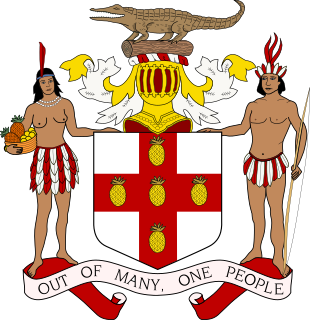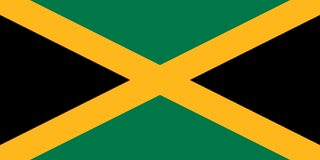The People's Political Party (PPP) was Jamaica's first modern political party.
The United People's Party is a political party in Jamaica. It was started by Antoinette Haughton-Cardenas in 2001 and first contested national elections in 2002, but received only 548 votes and failed to win a seat. It did not contest any further elections.

Early general elections were held in Jamaica on 15 December 1983. The election was boycotted by the main opposition party, the People's National Party, in protest at the refusal of the ruling Jamaican Labour Party to update the electoral roll. Whilst several minor parties participated in the election, most seats were unopposed: in the six seats where voting took place, voter turnout was about 55%, so this translated into a nationwide figure of 2.7%. It allowed the Labour Party to win all 60 seats in the House of Representatives, with their leader, Edward Seaga, continuing as Prime Minister.

The Liberator Party was a right-wing political party in Guyana.
The Jamaica Democratic Party was a political party in Jamaica. It contested national elections in 1944 when it received 4.0% of the vote, but failed to win a seat. It did not contest any further elections.
The United Party of Jamaica was a political party in Jamaica. It contested national elections in 1949, but received only 0.2% of the vote and failed to win a seat. It did not contest any further elections.
The Farmers' Party was a political party in Jamaica. It contested national elections in 1955, receiving 2.7% of the vote, but failed to win a seat. It did not contest any further elections.
The People's Freedom Movement was a political party in Jamaica. It first contested national elections in 1955, but received only 647 votes and failed to win a seat. It did not contest any further elections. The party made a submission to the Joint Select Committee considering Jamaica's independence constitution, arguing for the inclusion of a provision that would allow for a referendum on becoming a republic. The submission was not accepted.
The Republican Party was a political party in Jamaica. It first contested national elections in 1955, but received only 108 votes and failed to win a seat. It did not take part in elections in 1959 or 1962, but returned for the 1967 elections, in which it received only 45 votes. After failing to participate in the 1972, 1976 and 1980 elections it contested the 1983 elections, but received only 257 votes, again failing to win a seat. It did not contest any further elections.
The Independent Labour Party was a political party in Jamaica. It first contested national elections in 1959, but received only 0.8% of the vote and failed to win a seat. It did not contest any further elections.
The Jamaica United Party was a political party in Jamaica. It first contested national elections in 1967, but received only 163 votes and failed to win a seat. It did not contest any further elections.
The Jamaica We Party was a political party in Jamaica. It first contested national elections in 1967, but received only 133 votes and failed to win a seat. It did not contest any further elections.
The Christian Democratic Party was a political party in Jamaica. It first contested national elections in 1972, but received only 109 votes and failed to win a seat. It did not contest any further elections.
The Christian Conscience Movement was a political party in Jamaica. It first contested national elections in 1983. The elections that year saw a mass boycott as the People's National Party protested against the government. The CCM received only 704 votes, which amounted to 2.7% of the total, and failed to win a seat. It did not contest any further elections.
The Jamaica United Front was a political party in Jamaica.
The Imperial Ethiopian World Federation Incorporated Political Party is a political party in Jamaica. It was formed in 2002 by members of the Church of Haile Selassie I, a Rastafari sect. It first contested national elections in 2002, when it received just 162 votes and failed to win a seat. In the 2007 elections it won only 192 votes and remained without parliamentary representation.
The Jerusalem Bread Foundation was a minor political party in Jamaica.
The Convention Independent Party was a political party in Jamaica. It first contested national elections in 1959, when it received fewer than 305 votes and failed to win a seat. It did not contest any further elections.
The West Indian National Party was a political party in Trinidad and Tobago. It was founded on 18 November 1942, as a progressive party, aligned with the socialist views of trade unionists Rupert Gittens and Quintin O'Connor. One of the key planks of their platform was the nationalization of major industries. It contested the 1976 general elections, but received just 1,242 votes and failed to win a seat. It did not contest any further elections.

The United Republican Party (URP) is a political party in Guyana.


